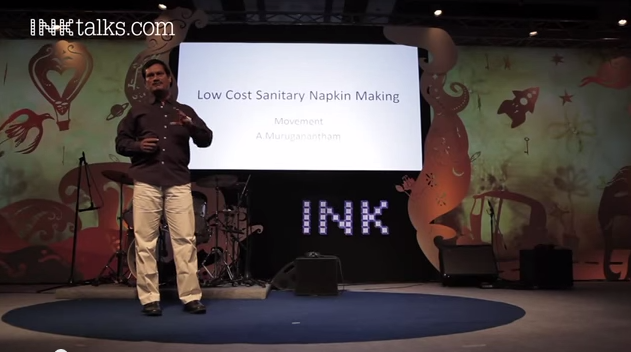Man Who Got His Period Develops Low-Cost Sanitary Napkins, Voted A TIME Influential Person

The journey of the man who once walked around with a blood-filled goat bladder in his pants to test his pad prototypes started in 1998. Arunachalam Muruganantham, a native of Tamil Nadu, India, asked his wife why she didn’t use a sanitary napkin after he saw her carrying a dirty rag to the bathroom. His wife responded by saying, if she did, her family would not have enough money to buy milk.
Muruganantham realized his wife wasn’t exaggerating after he went to the store himself. He found that one sanitary napkin was sold for the equivalent of 67 cents and that this was 40 times the actual cost of the raw material. So, Muruganantham decided to take matters into his own hands and build a machine that would produce sanitary napkins for women all over India.
“Young girls stop going to school after puberty because they don't have access to reliable sanitary pads. They use dangerously unhealthy substances like sand, ash and even hay during their menses, leading to numerous diseases. By providing them these pads, we can educate, employ and empower scores of women across the country,” Muruganantham told The New Indian Express.
The unit he created is a grinder-type machine that breaks down cellulose fluid into a soft cotton-looking material. It is then converted into rectangular squares using another machine. The pads are wrapped into a non-woven cloth and then disinfected. The entire unit is capable of making 120 sanitary pads per hour.
This past April, TIME magazine recognized Muruganantham as one of the 100 most influential people in the world — he shares the spotlight with people like Narendra Modi, Arvind Kejriwal, and Arundhati Roy.
So far, Muruganantham has made over 1,300 sanitary napkin machines in 11 countries, along with India, and employs over 12,500 women. "When I first got a mail from TIME magazine, I thought it was spam. You know, I keep getting these mails that say I have won ten million dollars, and then when I click on them, they ask for my credit card number,” he said. “Later, when I showed the mail to one of my colleagues, he shook my hand and congratulated me. That is when I realised that it was for real.”
However, Muruganantham’s success was not something that happened overnight. He felt criticism and could see the looks people in his family were giving him. The prototype-testing with the blood-filled goat bladder in his pants did not sit well with others. “I was left all alone in life, but I wasn't disheartened even for a minute,” he said. His wife even filed for divorce.
He worked five long years on this project and was eventually rewarded. Muruganantham collaborated with a textile owner in Coimbatore, and he was then entered into the National Innovation Award Competition held at the Indian Institute of Technology Madras. He won the award out of 943 entries. The people who mocked him eventually apologized, and his wife came back.
“Only 12 percent of the women in the country use sanitary napkins today. Using my machines and an all-women business model, I want the technology to reach all women in India,” he said
Take a look at one of Muruganantham's many talks below:



























